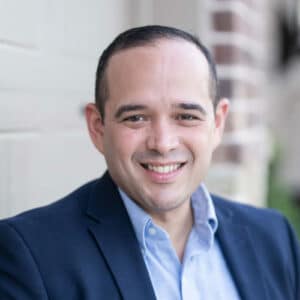How Allies Can Amplify the Voices of Women: Tips from Liberty Mutual’s Livio R. Perez
Q: As an ally, what strategies do you use to amplify the voices of women?
A: My first strategy is to look at how women can develop their skills for the moment and beyond. This involves:
- Being invested: Allies use their advantage, voice, and power to elevate, amplify, and take action in partnership with others. I am passionate about creating an environment where all voices are represented and heard in the discussion and the solutions. It requires intentionality, an understanding of each individual’s strengths, and a focus on developing people for the moment. By understanding the people involved in a particular project, initiative, and team environment, I can anticipate potential dynamics and prepare each employee to do their best – coaching and supporting them if needed.
- By elevating the voices of people who have been under-heard and under-represented in the room, we can achieve richer, better decisions in a more efficient, effective, and inclusive way. I have seen amazing outcomes as a result of people with different and enriching perspectives coming together to achieve great success for the business.
- Providing techniques and practice: It’s important to provide practical techniques that employees can apply when they encounter circumstances where their voices are not being heard.
- Being prepared is critical to success as people are able to embrace the emotion of being talked over and respond from a position of productive control.
- I’ve asked people politely to allow another person in the room the space to finish their thoughts instead of transitioning into a new comment; I’ve also asked for others to weigh in on the comments made to ensure all perspectives are considered.
- In my career, it has been so rewarding to see my mentees effectively manage an interruption by practicing different body language techniques or voice fluctuations to prevent the interruption or setting the expectation– in a professional, courteous way as the interruption happens–that there’s more to add.
My second strategy is I set the tone during the situation at hand and harness a common purpose in the room. This involves:
- Setting the expectation: I try to build awareness with people in the room on common behaviors to be mindful of by setting the expectation that I’d like for everyone to contribute. For example, in most meetings, I share specific guidelines to be mindful of to disrupt common behaviors such as talking over.
- Using the tools at hand: Our virtual environment has enabled the ability to leverage new practical tools, such as the hand-raising option available in video conference tools. I’ve enjoyed using it as it creates a waiting room. When situations occur, such as an untimely interruption, I’ve acknowledged it and brought people back to the comments the original speaker was making. Prior to any meeting, I take time to write a couple of questions that can be used to roundtable so that everyone in the room is able to contribute. When possible, I ask people to reflect ahead of time to enable preparedness.
- Disrupting the moment: I’ve asked people politely to allow another person in the room to finish their thoughts. Also, instead of rushing into a new comment when situations happen, I’ve probed the room for understanding to enable clarity and transition into bringing others’ contributions to the table, deepening a particular thought or idea that was being rushed over through the disruption.
- Reading the room: I pay close attention to everyone’s facial expressions and leverage queues to invite those who have not spoken to step up in an engaging way. I often ask open-ended and probing questions such as: “What do you think about that option?” “How do you believe people will react to implementing this change?” “What risks do you see associated with it?”
- Assess effectiveness to drive continuous improvements: I take a moment to survey the room to assess our level of effectiveness in including everyone’s voices and set clear takeaways to make the next conversation more productive.
Q: How can allies step in to help prevent women from being talked over by others?
Allyship is a verb; and to be a genuine ally, you need to take action daily. At Liberty Mutual, we define an ally as someone who listens to understand, and learn from others’ experiences and is open to continue growing in their allyship.
I am an active member of our Men as Allies group, which provides tools and resources to develop gender awareness and to collaborate effectively with colleagues across differences of gender, race, and ethnicity. I continue to be focused on strengthening and increasing equitable and genuine relationships across differences to deepen inclusion and have had great dialogues with men that have led to commitments to prioritize disrupting behaviors.
To prevent women from being talked over, allies need to be very intentional and proactive at setting an environment for successful and productive dialogue. That takes effective preparation of discussions, an understanding of the audience (representation, strengths, opportunities, etc.), and setting expectations from the start.
At Liberty Mutual, we also have our Guidelines for Inclusion, which are nine practices that increase effective communication, collaboration, and problem-solving between individuals and groups. The Guidelines help employees think intentionally and create an environment where we are constantly working to include all voices in the conversation.
Q: You lead Liberty’s Employee Resource Group, Amigos@Liberty, which is focused on the Hispanic and Latinx community. How can individuals find a mentor through a company ERG?
There are so many ways to find a mentor through employee resource groups (ERGs). Our Amigos ERG – which serves as a resource to connect, support, and develop Liberty Mutual Insurance’s Hispanic/Latinx community – has established a few formal mentorship programs where employees are matched based on a specific set of strengths, experiences, and developmental focus areas.
- One resource is a cross-ERG collaboration program for leaders of color, and the other is specifically targeted to Amigos ERG members. Both have been great sources for individuals to leverage their learnings and encourage others to become mentors and mentees.
- I’d explore what offerings exist through your company’s ERGs, and if a mentorship program doesn’t exist, there’s always an opportunity to be part of the solution and organize a working team to create it.
- Throughout my career, I’ve gained as much value from “informal” mentorships as I’ve gained from more “formal” ones. The Amigos ERG enables several opportunities for people to connect with each other to form genuine, invested relationships. Having a variety of formal and informal opportunities is important as it caters to various levels of comfort. One informal way in which the Amigos ERG connects people is through networking events where people learn about culture, community, career, commerce.
- Personally, I suggest people try on and connect/reach out to someone who you admire in the organization, someone who you feel you can learn something that is important to you. At Liberty, leaders in the organization are passionate about helping other people succeed. Many of my mentorship relations have developed from relationships with prior managers, with people I’ve collaborated with, project sponsors, leaders who had a moving or intriguing perspective that I wanted to learn more about. I’ve learned that by reaching out, I didn’t lose anything and have gained amazing new mentors, champions, and friends for life.
- It is also important to have and be champions, who are people who can advocate for you in rooms where you are not present. Champions tend to be people whose trust you’ve earned by your long-term contributions to success and deeply understand your strengths capabilities to the extent that they’d confidently advocate for you.
Q: What is the most important thing you can do to provide mentorship to a colleague? What have you learned by being a mentor?
It is critical to understand your mentee’s key objectives—their “superpowers”—and to what extent they are leveraging their superpowers today to impact success. A great mentor gets involved in getting to know a mentee’s strengths, helps a mentee discover how much more they can achieve, dream, and do and how their uniqueness can enable success.
As a mentor, I’ve learned great lessons to improve the way I meet people where they are, how I interact with them, how to think through their lens and how to support them. I am so grateful to the many women who have given me the opportunity and trust to be part of their career journey because, thanks to them, I’ve not only learned ways to challenge the status quo but also what being an ally truly is.
Mentorship is an amazing way to contribute to others’ development while also contributing to your own journey, and I am forever grateful to the many people who have put their vulnerabilities on the table and trust in me to be part of their support system.

